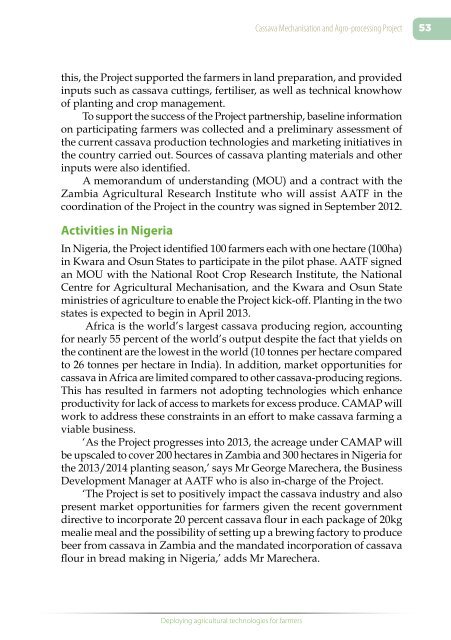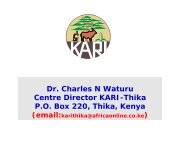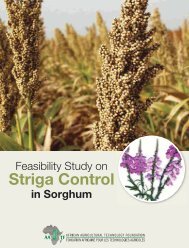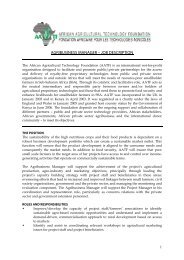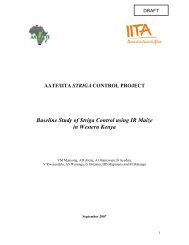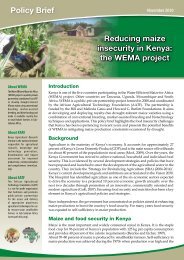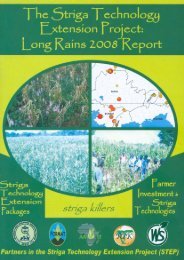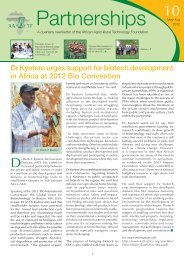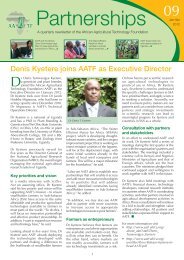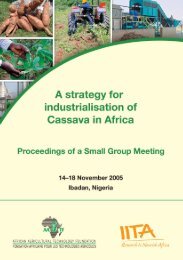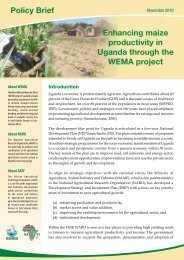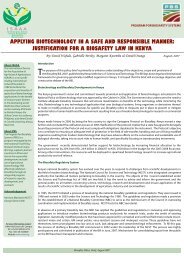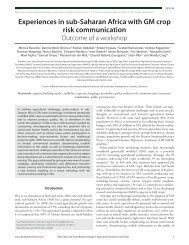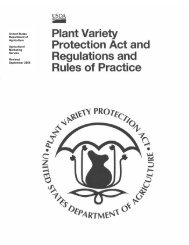Annual Report 2012 - African Agricultural Technology Foundation
Annual Report 2012 - African Agricultural Technology Foundation
Annual Report 2012 - African Agricultural Technology Foundation
You also want an ePaper? Increase the reach of your titles
YUMPU automatically turns print PDFs into web optimized ePapers that Google loves.
Cassava Mechanisation and Agro-processing Project<br />
53<br />
this, the Project supported the farmers in land preparation, and provided<br />
inputs such as cassava cuttings, fertiliser, as well as technical knowhow<br />
of planting and crop management.<br />
To support the success of the Project partnership, baseline information<br />
on participating farmers was collected and a preliminary assessment of<br />
the current cassava production technologies and marketing initiatives in<br />
the country carried out. Sources of cassava planting materials and other<br />
inputs were also identified.<br />
A memorandum of understanding (MOU) and a contract with the<br />
Zambia <strong>Agricultural</strong> Research Institute who will assist AATF in the<br />
coordination of the Project in the country was signed in September <strong>2012</strong>.<br />
Activities in Nigeria<br />
In Nigeria, the Project identified 100 farmers each with one hectare (100ha)<br />
in Kwara and Osun States to participate in the pilot phase. AATF signed<br />
an MOU with the National Root Crop Research Institute, the National<br />
Centre for <strong>Agricultural</strong> Mechanisation, and the Kwara and Osun State<br />
ministries of agriculture to enable the Project kick-off. Planting in the two<br />
states is expected to begin in April 2013.<br />
Africa is the world’s largest cassava producing region, accounting<br />
for nearly 55 percent of the world’s output despite the fact that yields on<br />
the continent are the lowest in the world (10 tonnes per hectare compared<br />
to 26 tonnes per hectare in India). In addition, market opportunities for<br />
cassava in Africa are limited compared to other cassava-producing regions.<br />
This has resulted in farmers not adopting technologies which enhance<br />
productivity for lack of access to markets for excess produce. CAMAP will<br />
work to address these constraints in an effort to make cassava farming a<br />
viable business.<br />
‘As the Project progresses into 2013, the acreage under CAMAP will<br />
be upscaled to cover 200 hectares in Zambia and 300 hectares in Nigeria for<br />
the 2013/2014 planting season,’ says Mr George Marechera, the Business<br />
Development Manager at AATF who is also in-charge of the Project.<br />
‘The Project is set to positively impact the cassava industry and also<br />
present market opportunities for farmers given the recent government<br />
directive to incorporate 20 percent cassava flour in each package of 20kg<br />
mealie meal and the possibility of setting up a brewing factory to produce<br />
beer from cassava in Zambia and the mandated incorporation of cassava<br />
flour in bread making in Nigeria,’ adds Mr Marechera.<br />
Deploying agricultural technologies for farmers


